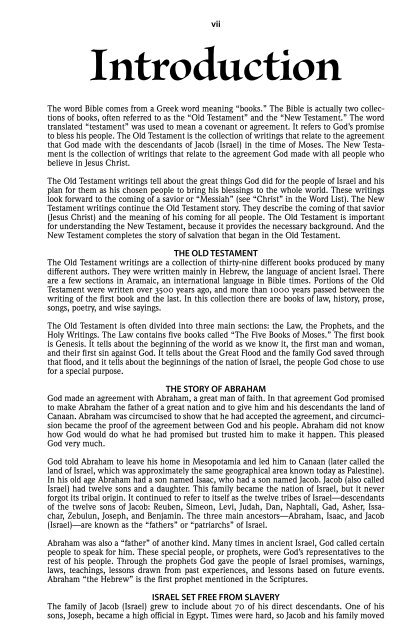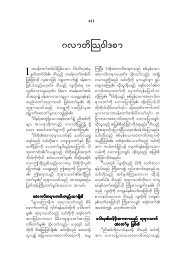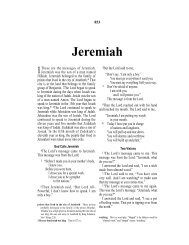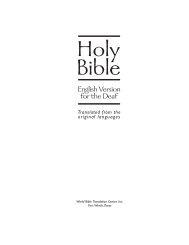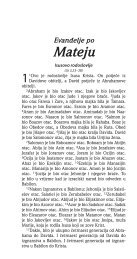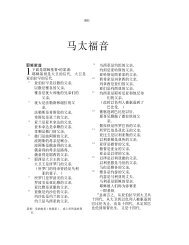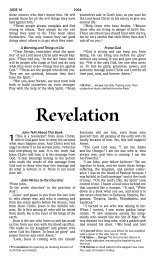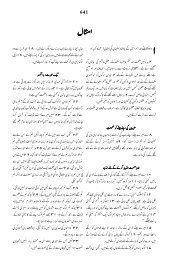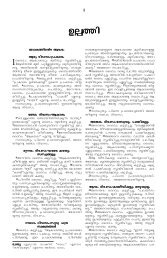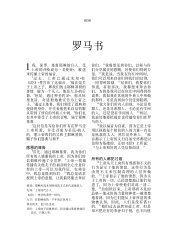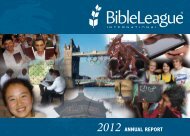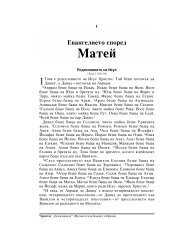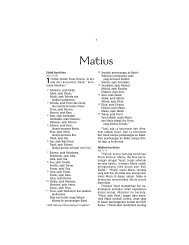Easy-to-Read Version™
Easy-to-Read Version™
Easy-to-Read Version™
Create successful ePaper yourself
Turn your PDF publications into a flip-book with our unique Google optimized e-Paper software.
vii<br />
Introduction<br />
The word Bible comes from a Greek word meaning “books.” The Bible is actually two collections<br />
of books, often referred <strong>to</strong> as the “Old Testament” and the “New Testament.” The word<br />
translated “testament” was used <strong>to</strong> mean a covenant or agreement. It refers <strong>to</strong> God’s promise<br />
<strong>to</strong> bless his people. The Old Testament is the collection of writings that relate <strong>to</strong> the agreement<br />
that God made with the descendants of Jacob (Israel) in the time of Moses. The New Testament<br />
is the collection of writings that relate <strong>to</strong> the agreement God made with all people who<br />
believe in Jesus Christ.<br />
The Old Testament writings tell about the great things God did for the people of Israel and his<br />
plan for them as his chosen people <strong>to</strong> bring his blessings <strong>to</strong> the whole world. These writings<br />
look forward <strong>to</strong> the coming of a savior or “Messiah” (see “Christ” in the Word List). The New<br />
Testament writings continue the Old Testament s<strong>to</strong>ry. They describe the coming of that savior<br />
(Jesus Christ) and the meaning of his coming for all people. The Old Testament is important<br />
for understanding the New Testament, because it provides the necessary background. And the<br />
New Testament completes the s<strong>to</strong>ry of salvation that began in the Old Testament.<br />
THE OLD TESTAMENT<br />
The Old Testament writings are a collection of thirty-nine different books produced by many<br />
different authors. They were written mainly in Hebrew, the language of ancient Israel. There<br />
are a few sections in Aramaic, an international language in Bible times. Portions of the Old<br />
Testament were written over 3500 years ago, and more than 1000 years passed between the<br />
writing of the first book and the last. In this collection there are books of law, his<strong>to</strong>ry, prose,<br />
songs, poetry, and wise sayings.<br />
The Old Testament is often divided in<strong>to</strong> three main sections: the Law, the Prophets, and the<br />
Holy Writings. The Law contains five books called “The Five Books of Moses.” The first book<br />
is Genesis. It tells about the beginning of the world as we know it, the first man and woman,<br />
and their first sin against God. It tells about the Great Flood and the family God saved through<br />
that flood, and it tells about the beginnings of the nation of Israel, the people God chose <strong>to</strong> use<br />
for a special purpose.<br />
THE STORY OF ABRAHAM<br />
God made an agreement with Abraham, a great man of faith. In that agreement God promised<br />
<strong>to</strong> make Abraham the father of a great nation and <strong>to</strong> give him and his descendants the land of<br />
Canaan. Abraham was circumcised <strong>to</strong> show that he had accepted the agreement, and circumcision<br />
became the proof of the agreement between God and his people. Abraham did not know<br />
how God would do what he had promised but trusted him <strong>to</strong> make it happen. This pleased<br />
God very much.<br />
God <strong>to</strong>ld Abraham <strong>to</strong> leave his home in Mesopotamia and led him <strong>to</strong> Canaan (later called the<br />
land of Israel, which was approximately the same geographical area known <strong>to</strong>day as Palestine).<br />
In his old age Abraham had a son named Isaac, who had a son named Jacob. Jacob (also called<br />
Israel) had twelve sons and a daughter. This family became the nation of Israel, but it never<br />
forgot its tribal origin. It continued <strong>to</strong> refer <strong>to</strong> itself as the twelve tribes of Israel—descendants<br />
of the twelve sons of Jacob: Reuben, Simeon, Levi, Judah, Dan, Naphtali, Gad, Asher, Issachar,<br />
Zebulun, Joseph, and Benjamin. The three main ances<strong>to</strong>rs—Abraham, Isaac, and Jacob<br />
(Israel)—are known as the “fathers” or “patriarchs” of Israel.<br />
Abraham was also a “father” of another kind. Many times in ancient Israel, God called certain<br />
people <strong>to</strong> speak for him. These special people, or prophets, were God’s representatives <strong>to</strong> the<br />
rest of his people. Through the prophets God gave the people of Israel promises, warnings,<br />
laws, teachings, lessons drawn from past experiences, and lessons based on future events.<br />
Abraham “the Hebrew” is the first prophet mentioned in the Scriptures.<br />
ISRAEL SET FREE FROM SLAVERY<br />
The family of Jacob (Israel) grew <strong>to</strong> include about 70 of his direct descendants. One of his<br />
sons, Joseph, became a high official in Egypt. Times were hard, so Jacob and his family moved


